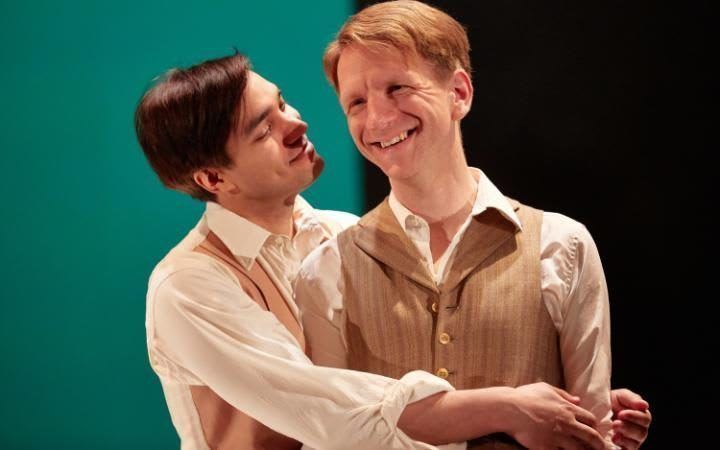As the pound yo-yos, stock markets wobble and Brexiteers morph into Regrexiteers, one might wonder what relevance a play about the gilded youth of yesteryear has to an audience whose minds are preoccupied with fear of financial, political and social meltdown.
How can we sympathise with the landed, moneyed aristocracy who populate Evelyn Waugh’s Brideshead Revisited, when their only concern is how to spend their time and their inheritance?
But perhaps Charles Ryder’s nostalgic reflections are more pertinent than they first seem? After all, the novel is all about guilt and regret: the elegiac, sweetly painful longing for a past which can never be regained.
Bryony Lavery’s adaptation of Waugh’s idyllic anthem to lost youth, directed by Damien Cruden for English Touring Theatre, has much merit, though in condensing a 300-page novel into just over two hours, nuances are inevitably sacrificed.
Cruden and designer Sara Perks sensibly—presumably in the interests of both dramatic momentum and financial economy—reject realism in favour of minimalism, using black sliding panels and an evocative colour palette (lighting by Richard G Jones) to evoke the novel’s plush, headily sensuous locales—Oxford quadrangles, the Baroque elegance of Brideshead Castle, Venetian splendour, a Morocco drinking den. But there is a touch of travelogue, as Ryder repeatedly announces, "I find myself in…".
Through the shifting apertures, we glimpse clerics, scholars and socialites and period flavour is further enhanced by the presence of onstage carbon microphones, though the purpose of the latter is not entirely clear.
The subtitle of Waugh’s novel is The Sacred and Profane Memories of Captain Charles Ryder and it is this bipartite division that proves most problematic for Lavery. The novel is a Kunstlerroman and conversion text, and the last words declare that Ryder is "looking unusually cheerful". Yet the comedy is undermined by the novel’s tragic tone and by ironic inconsistencies and incompatibilities, which Lavery plasters over with a trowel.
In this dramatization, Sebastian Flyte’s drinking is less a tragic outcome of Ryder’s unmoving heterosexuality than an opportunity for "harmless", flamboyant excess, beginning with Ryder’s first encounter with Flyte when the latter vomits through the undergrad’s ground-floor window. Taking three male roles—Bridey Flyte, Kurt Mottram and Rex Mottram—Shuna Snow hams so shamelessly that the accents garble the text into intelligibility. To balance the prevailing frivolity, Brian Ferguson, as Ryder, shouts furiously and inappropriately.
Is Waugh’s novel a human tragedy or a divine comedy? The contradiction between the comic-romantic and tragic-ironic is not addressed here.
Instead, God dominates. Writing to a friend, Evelyn Waugh professed that, "the book is about God." Lavery has taken this to heart and crosses loom large. Catholic culture is indeed the guiding medium for the Marchmain family, once so secure and now so fragile.
The burden of sustaining membership of this culture drives Sebastian to Kurt Mottram and Lord Marchmain to Byronic exile in the arms of Cara; Julia Flyte's relationship with Rex offers her a Gatsby-like escapism, while Cordelia chooses the realism of the Spanish war.
The prevailing Catholic guilt is tedious enough in the novel and the ambiguity of Marchmain’s deathbed fiasco leads some readers to doubt whether Ryder does in fact convert; as Waugh notes, religion is generally portrayed as "a hobby which some people professed and others did not." But, Lavery devotes a disproportionate bleeding chunk of this adaptation to Marchmain’s deathbed submission.
The text presents us with Ryder’s memories and Brian Ferguson speaks directly to the audience in charting his relationship with the dazzling Marchains, mimicking the first-person narrative voice of the novel. The first part of Lavery’s adaptation successfully conjures the world of privilege, aristocratic beauty and charm which awes and dumbfounds the naïve Charles, a paradisiacal pastoralism, entered through a "low door in the wall... which opened on an enclosed and enchanted garden."
There is a strong dynamic between Ferguson and Christopher Simpson’s teddy-bear-clutching Sebastian, though it’s regrettable that the homosexual undertones of Waugh’s novel are made explicit, lessening their suggestive impact.
The female characters are rather neglected; Julia (Rosie Hilal) and Lady Marchmain (Caroline Harker) both require greater definition. Paul Shelley is a fittingly befuddled representative of the elderly orders, as Lord Marchmain and Mr Ryder.
Ryder becomes an architectural painter and is commissioned to memorialize houses that will soon be destroyed; as a "presage of doom" he laments the passing of blinkered aristocratic traditions that are threatened by WWII and wider political fracture.
So we may find it difficult to erase our nostalgia for Jeremy Irons and Anthony Andrews in these roles. But, perhaps Waugh’s own words—a "warning" on the dust jacket of the 1945 edition—can provide solace in troubled times:
Whom then can I hope to please? Perhaps... those who look to the future with black forebodings and need more solid comfort than rosy memories. For the latter I have given my hero, and them, if they will allow me, a hope, not, indeed, that anything but disaster lies ahead, but that the human spirit, redeemed, can survive all disasters.
